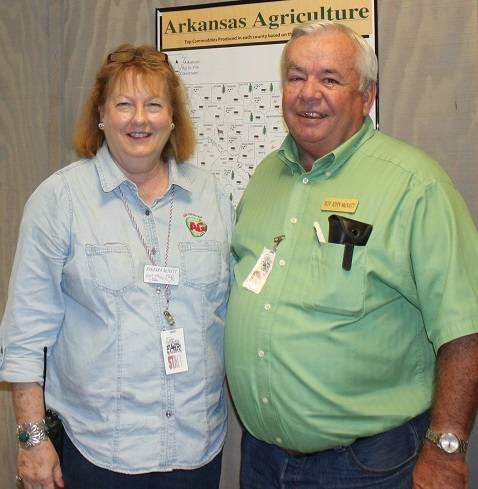Miller County Farmers of the Month are Roy John and Barbara McNatt
TEXARKANA, Ark. –
Dairy farming is more than just a job. It is a way of life for the men and women who live and work on a dairy farm. Many dairy farmers actually grew up on their farm, and are following the footsteps of those who came before them. So for October, we would like to honor and show gratitude to such a family: Roy John and Barbara McNatt.
Roy John and Barbara met at church and when they were 17 and 18, they were married. She was a junior at Texas High School and he attended high school at Arkansas High School. They were married and both graduated from Arkansas High.
Mr. & Mrs. McNatt have been farming together 48 years. Roy John is a third generation dairy farmer. His mother had the dairy before him and her dad, W. C. Stone, had it before that.
When asked what made them choose farming as a career, they replied that it’s what they love doing.
They once farmed dairy cattle, hay and beef cattle but no longer have beef cattle, just dairy and hay.
Barbara says her favorite part about farming is raising baby calves while Roy John loves the openness of being outside and working with cattle. He says he loves baling hay.
The business of producing milk in America is a complex process and involves the efforts of many to get the milk from a farm’s grass to your glass. When asked what they would like the public to know about the commodities they produce, they replied that there is a “misconception about antibiotics and hormones in the milk we produce”. Theirs have none. All milk is carefully tested for antibiotics. Any milk that tests positive is disposed of immediately, and does not enter into the food supply.
They are the parents of two children and grandparents to three. Their children grew
up helping with the farm and the grandkids love to visit so they can feed the baby
calves.
Dairy farmers work hard every day caring for their animals and land so that they can
provide fresh, great-tasting, wholesome, and nutritious dairy products. their success
depends not only on healthy cows but also on clean air and water, healthy soil and
vibrant ecosystems. Mr. & Mrs. McNatt are the last dairy farmers left in Miller County.
Fun Dairy Facts:
In 1856, French scientist Louis Pasteur discovered that heating liquids to high temperatures kill bacteria. This process is called pasteurization and it protects the purity and flavor of milk.
U.S. cows give an average of 6 ½ gallons of milk per day. That’s over 100 glasses of milk – enough for 33 children to have 3 glasses each day!
Watch this beautiful tribute to dairy farmers by the infamous Paul Harvey - http://bit.ly/1LJ77kE
By Jennifer Caraway
County Extension Agent - Agriculture
The Cooperative Extension Service
U of A System Division of Agriculture
Media Contact: Jennifer Caraway
County Extension Agent - Agriculture
U of A Division of Agriculture
Cooperative Extension Service
400 Laurel Street, Suite 215 Texarkana AR 71854
(870) 779-3609
jcaraway@uada.edu
Related Links
The Arkansas Cooperative Extension Service is an equal opportunity institution.
If you require a reasonable accommodation to participate or need materials in another
format, please contact your County Extension office (or other appropriate office)
as soon as possible. Dial 711 for Arkansas Relay.
Pursuant to 7 CFR § 15.3, the University of Arkansas System Division of Agriculture
offers all its Extension and Research programs and services (including employment)
without regard to race, color, sex, national origin, religion, age, disability, marital
or veteran status, genetic information, sexual preference, pregnancy or any other
legally protected status, and is an equal opportunity institution.
